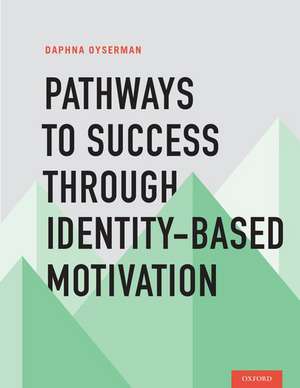Pathways to Success Through Identity-Based Motivation
Autor Daphna Oysermanen Limba Engleză Paperback – 16 apr 2015
Preț: 393.25 lei
Preț vechi: 514.07 lei
-24% Nou
Puncte Express: 590
Preț estimativ în valută:
75.25€ • 80.47$ • 62.74£
75.25€ • 80.47$ • 62.74£
Carte tipărită la comandă
Livrare economică 07-14 aprilie
Preluare comenzi: 021 569.72.76
Specificații
ISBN-13: 9780195341461
ISBN-10: 0195341465
Pagini: 312
Dimensiuni: 277 x 213 x 18 mm
Greutate: 0.73 kg
Editura: Oxford University Press
Colecția OUP USA
Locul publicării:New York, United States
ISBN-10: 0195341465
Pagini: 312
Dimensiuni: 277 x 213 x 18 mm
Greutate: 0.73 kg
Editura: Oxford University Press
Colecția OUP USA
Locul publicării:New York, United States
Recenzii
Daphna Oyserman does an exceptional job guiding the reader from concept (IBM theory), to importance of school-focused lens, to intervention (STJ), and finally a step-by-step implementation (manual). The author does a good job using the evidence base to support her ideas of IBM. Oyserman also answers many questions as to why she laid out the book the way she did, why she picked the STJ intervention, and her reasoning for how this book can be used. School settings provide the most beneficial settings for this book.
This unique book captures the pathway from a powerful theory to an effective intervention. Accessible to educators, but thorough enough for researchers, the book lays out the Identity-Based Motivation Theory then covers the research that supports it, how it was translated into an intervention, and the evaluation process that showed the intervention worked as the theory said it should. Dr. Oyserman has written a clear model for translating psychological theory into effective real-world intervention.
Pathways to Success Through Identity-Based Motivation provides students with the frameworks, time and space to consider who they hope to be as adults and recognize that what they are doing right now offers them a pathway to achieving their future possible selves.
Daphna Oyserman beautifully lays out the evidence supporting the School to Jobs intervention for both researchers and teachers along with instructions to implement the intervention. Pathways to Success Through Identity-Based Motivation will help educators integrate identity work into their programs and inspire a generation of future researchers to carefully design interventions that are effective and easy to implement. This book should be at the top of every teacher's reading list.
Professor Oyserman makes a compelling case for a way to help youths succeed in life. She furnishes both grounded, theoretical bases, and ready-to-use practical tools that adults responsible for guiding youths can use. I highly recommend this book to educators, youth, practitioners, and social workers interested in helping youths connect the dots and realize their dream.
Students everywhere have vivid pictures of their future selves and of the jobs and careers they would like to attain. Why do so many fail to realize them? This compelling and clearly written volume provides the answer and a robust theoretical and practical blueprint for what to do about it. Oyserman's formula: begin with students' identities and design school settings that help them realize that their future starts now, that what they are doing in school is relevant to their desired possible selves, and that struggle and difficulty are to be expected on the path to the future. The science and the wisdom of this valuable book are essential for educators, parents, and researchers alike.
Professor Oyserman's possible selves approach has a sound theoretical basis and has been empirically supported by experimental and longitudinal evidence. What amazes me is that even though the possible selves approach is developed in North America, I think it potentially has the universality to work well in an Asian context as well. In fact, my preliminary research using a similar approach has been promising in improving youth's well-being in Singapore. The manual is very practical and easily adaptable to an Asian context.
This unique book captures the pathway from a powerful theory to an effective intervention. Accessible to educators, but thorough enough for researchers, the book lays out the Identity-Based Motivation Theory then covers the research that supports it, how it was translated into an intervention, and the evaluation process that showed the intervention worked as the theory said it should. Dr. Oyserman has written a clear model for translating psychological theory into effective real-world intervention.
Pathways to Success Through Identity-Based Motivation provides students with the frameworks, time and space to consider who they hope to be as adults and recognize that what they are doing right now offers them a pathway to achieving their future possible selves.
Daphna Oyserman beautifully lays out the evidence supporting the School to Jobs intervention for both researchers and teachers along with instructions to implement the intervention. Pathways to Success Through Identity-Based Motivation will help educators integrate identity work into their programs and inspire a generation of future researchers to carefully design interventions that are effective and easy to implement. This book should be at the top of every teacher's reading list.
Professor Oyserman makes a compelling case for a way to help youths succeed in life. She furnishes both grounded, theoretical bases, and ready-to-use practical tools that adults responsible for guiding youths can use. I highly recommend this book to educators, youth, practitioners, and social workers interested in helping youths connect the dots and realize their dream.
Students everywhere have vivid pictures of their future selves and of the jobs and careers they would like to attain. Why do so many fail to realize them? This compelling and clearly written volume provides the answer and a robust theoretical and practical blueprint for what to do about it. Oyserman's formula: begin with students' identities and design school settings that help them realize that their future starts now, that what they are doing in school is relevant to their desired possible selves, and that struggle and difficulty are to be expected on the path to the future. The science and the wisdom of this valuable book are essential for educators, parents, and researchers alike.
Professor Oyserman's possible selves approach has a sound theoretical basis and has been empirically supported by experimental and longitudinal evidence. What amazes me is that even though the possible selves approach is developed in North America, I think it potentially has the universality to work well in an Asian context as well. In fact, my preliminary research using a similar approach has been promising in improving youth's well-being in Singapore. The manual is very practical and easily adaptable to an Asian context.
Notă biografică
Daphna Oyserman, Ph.D., is a social scientist at the University of Southern California; she is a Dean's Professor of Psychology and Professor of Education and Communication as well as founding co-director of the Center for Mind and Society. She was recently a fellow at the Center for Advanced Studies in the Behavioral Sciences (2009-2010) and a senior fellow at the Michigan Society of Fellows (2012-2013); other honors include a W.T. Grant Faculty Scholar Award, the Humboldt Scientific Contribution Prize of the German Alexander von Humboldt Foundation, two "Best Research Paper " awards from the Society for Social Work Research, and Fellow status in the American Psychological Association, Association for Psychological Science, Society for Personality and Social Psychology, and Society for Experimental Social Psychology.















